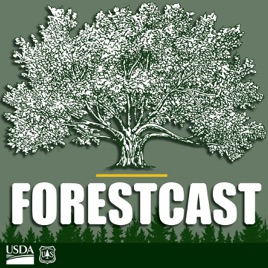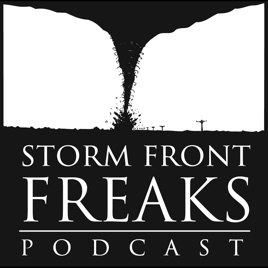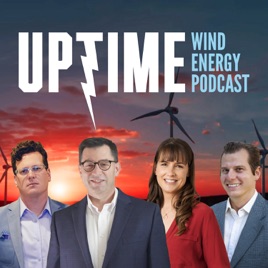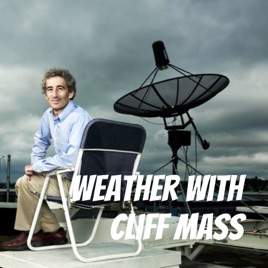
Advertise on podcast: Forestcast
Rating
4.9 from
Country
This podcast has
27 episodes
Language
Publisher
Explicit
No
Date created
2020/02/24
Average duration
31 min.
Release period
13 days
Description
As a daily weather forecast evaluates current atmospheric conditions and predicts if it’s likely to rain in the near future, Forestcast shows you what’s happening in the forests of the Northeast and Midwest, and where those forest ecosystems might be headed. From the forefront of forest research, the Northern Research Station invites you inside the largest forest research organization in the world — the USDA's Forest Service. In each episode, you’ll hear stories, interviews, and special in-depth anthologies of the science that's studying, questioning, and solving some of today's most compelling forest issues.
Podcast episodes
Check latest episodes from Forestcast podcast
Flying the Nuthatch Home
2023/06/27
Once spanning nearly 6 million acres in Missouri's Ozarks, the shortleaf pine and oak woodland ecosystem has dwindled to 100,000 acres today. Along with the loss of this habitat, a bird—the brown-headed nuthatch—disappeared as well. However, after decades of woodland restoration, the brown-headed nuthatch has returned to Missouri—by plane.
Over two summers in 2020 and 2021, a team of scientists successfully captured and flew 102 birds from Arkansas to Missouri, marking the bird’s return to the state after being locally extinct since 1907. Weighing in at a mere one-third of an ounce, approximately the combined weight of a nickel and a quarter, the return of the brown-headed nuthatch is nevertheless a weighty event.
Related Research:
Effects of Pine-oak Woodland Restoration on Breeding Bird Densities in the Ozark-Ouachita Interior Highlands (2019) Site Occupancy of Brown-headed Nuthatches Varies with Habitat Restoration and Range-limit Context (2015) Resource Configuration and Abundance Affect Space use of a Cooperatively Breeding Resident Bird (2014) Scientists:
Frank Thompson, Research Wildlife Biologist, Northern Research Station, Columbia, Missouri Jody Eberly, Wildlife Biologist/Fire Mgmt. Officer (Retired), Mark Twain National Forest, Rolla, Missouri Angelina Trombley, Wildlife Biologist, Mark Twain National Forest, Doniphan, Missouri We used the following recordings from the Macaulay Library at the Cornell Lab of Ornithology: ML180391131 (Milton Hobbs, Georgia, USA), ML225986 (Bob McGuire, Florida, USA) & ML unknown (Andrew Spencer, Florida, USA)
Produced by the USDA Forest Service Northern Research Station.
Want more information? Visit us at www.fs.usda.gov/research/nrs/products/multimedia/podcasts
Any questions? Connect with us on Twitter!
more
Women of Research: Our Sustainable Future with Cindi West
2023/04/13
Cindi West has over 30 years of experience working across private industry, academia, and federal government in a variety of jobs to ensure sustainability of natural resources. In February 2021 she assumed the position of Director of the Northern Research Station and the Forest Products Lab.
She has served in various leadership roles in the Forest Service, including as the Director of the Office of Sustainability & Climate Change, Associate Deputy Chief for R&D, Director for Resource Use Sciences, and Deputy Station Director for Pacific Northwest Research Station.
Cindi holds a BS degree in Forestry Management, an MBA in Marketing and Management, and a PhD in Wood Science and Forest Products from Virginia Tech. As a research scientist, she published more than 60 papers and presented at more than 80 conferences on forest sector trade and industry development.
Scientist:
Cindi West, Station Director, Northern Research Station, Madison, Wisconsin If you're interested in hearing from more women in the Forest Service, visit the National Forest Service Library and their HerStory oral history project.
Produced by the USDA Forest Service Northern Research Station.
Want more information? Visit us at www.nrs.fs.usda.gov/podcast/3/
Any ideas or questions? Connect with us on Twitter!
more
Women of Research: Scientific & Ethical Integrity with Maggie Hardy
2023/04/10
Maggie Hardy is the program manager of the Rocky Mountain Research Station Forest and Woodland Ecosystems Program, a group of scientists that develops and delivers scientific knowledge and management tools for sustaining and restoring the health, biodiversity, productivity, and ecosystem processes of forest and woodland landscapes.
Before joining the Rocky Mountain Research Station, Maggie served as Chief Regulatory Scientist and as an Executive Director with the Australian Pesticides and Veterinary Medicines Authority. In these roles, Maggie managed areas of policy; regulation and budget; provided strategic stakeholder engagement; and led integrated learning and development initiatives. In previous federal government roles, including with the Centers for Disease Control and Prevention (CDC) in Atlanta, Ga., Maggie held broad responsibilities for program implementation and regulatory assurance, as well as emergency response and preparedness. Her career has focused on incorporating research in drug discovery, bioterrorism agents, vector-borne diseases, and foodborne, waterborne, and environmental diseases.
Related Research:
Engaging Rural Australian Communities in National Science Week Helps Increase Visibility for Women Researchers (2017) Moving Beyond Metrics: A Primer for Hiring and Promoting a Diverse Workforce in Entomology and Other Natural Sciences (2017) Create Ethics Codes to Curb Sex Abuse (2014) Spider-Venom Peptides: Structure, Pharmacology, and Potential for Control of Insect Pests (2013) Scientist:
Maggie Hardy, Forest & Woodland Ecosystems Program Manager, Rocky Mountain Research Station, Flagstaff, Arizona If you're interested in hearing from more women in the Forest Service, visit the National Forest Service Library and their HerStory oral history project.
Produced by the USDA Forest Service Northern Research Station.
Want more information? Visit us at www.nrs.fs.usda.gov/podcast/3/
Any ideas or questions? Connect with us on Twitter!
more
Women of Research: Changing the World Through Soil with Deb Page-Dumroese
2023/04/06
Research soil scientist Deb Page-Dumroese’s research interests center around maintaining soil productivity during and after land management activities.
As site principal investigator for several North American Long-Term Soil Productivity Study plots, Deb is well-versed in the pre- and post-treatment sampling necessary to determine changes in above- and below-ground nutrient properties associated with harvesting, organic matter removal, and biochar additions. In partnership with the Missoula Technology Development Center (Keith Windell) and Dr. Nate Anderson (RMRS) she developed a biochar spreader to easily distribute biochar on forest sites.
Related Research:
Biochar Basics: An A-to-Z Guide to Biochar Production, Use, and Benefits (2022) Forest Management and Biochar for Continued Ecosystem Services (2022) Development and Use of a Commercial-Scale Biochar Spreader (2016) Forest Soil Disturbance Monitoring Protocol: Volume II: Supplementary Methods, Statistics, and Data Collection (2009) Soil Physical Property Changes at the North American Long-Term Soil Productivity Study Sites: 1 and 5 Years After Compaction (2006) Scientist:
Deb Page-Dumroese, Research Soil Scientist, Rocky Mountain Research Station, Moscow, Idaho If you're interested in hearing from more women in the Forest Service, visit the National Forest Service Library and their HerStory oral history project.
Produced by the USDA Forest Service Northern Research Station.
Want more information? Visit us at www.nrs.fs.usda.gov/podcast/3/
Any ideas or questions? Connect with us on Twitter!
more
Women of Research: A Life of Healthy Forests with Jenny Juzwik
2023/04/03
Research plant pathologist, Jenny Juzwik, conducts studies on diseases of trees that impact forest health and productivity.
Her career-long interest and passion has been the study of interactions among microorganisms and insects associated with disease occurrence and development. One particular focus has been on the insects responsible for transmission of the oak wilt fungus, Bretziella fagacearum. In 2014 she completed research that involved elucidation of the major biotic determinants of hickory decline and investigation of the role(s) putative pathogens play in the complex. In 2010, she initiated 13 years of investigations of bark and ambrosia beetles associated with eastern black walnut in the Midwestern states and their potential as carriers of the Thousand Cankers Disease fungus, Geosmithia morbida, as well as other pathogenic fungi that may cause symptoms similar to those of thousand cankers disease.
Related Research:
Oak Wilt StoryMap: A Regional View of Oak Wilt and its Management (2022) Matching Causes with Symptoms: Research Improves Diagnosis of Declining Eastern Black Walnut (2020) Ambrosia Beetles and Bark-Colonizing Weevils Carry Thousand Cankers Disease Fungus (2016) Scientist:
Jenny Juzwik, Research Plant Pathologist, Northern Research Station, St, Paul, Minnesota If you're interested in hearing from more women in the Forest Service, visit the National Forest Service Library and their HerStory oral history project.
Produced by the USDA Forest Service Northern Research Station.
Want more information? Visit us at www.nrs.fs.usda.gov/podcast/3/
Any ideas or questions? Connect with us on Twitter!
more
Women of Research: The Nature of Stewardship with Lindsay Campbell
2023/03/30
Research social scientist, Lindsay Campbell, explores the dynamics of civic stewardship, environmental governance, and sustainability policymaking--with a particular emphasis on issues of social and environmental justice—all from New York City.
She is a founding member of the New York City Urban Field Station, which was jointly created by the Northern Research Station and the New York City Department of Parks and Recreation. The Urban Field Station develops and applies adaptive management and science to improve human well-being and the environment in urban metropolitan areas. She creates transdisciplinary spaces of collaboration between land managers, scientists, artists, and other practitioners.
Related Research:
Stewardship Mapping with National Forests to Support Equitable, Inclusive Partnerships (2022) Activating Urban Environments as Social Infrastructure Through Civic Stewardship (2021) Building Adaptive Capacity Through Civic Environmental Stewardship: Responding to COVID-19 Alongside Compounding and Concurrent Crises (2021) Forest Service Research Evaluates Public Response to Transformed Landfill (2016) Scientist:
Lindsay Campbell, Research Social Scientist, Northern Research Station, New York, New York If you're interested in hearing from more women in the Forest Service, visit the National Forest Service Library and their HerStory oral history project.
Produced by the USDA Forest Service Northern Research Station.
Want more information? Visit us at www.nrs.fs.usda.gov/podcast/3/
Any ideas or questions? Connect with us on Twitter!
more
Women of Research: Plots to Blocks with Sjana Schanning
2023/03/27
Ecologist Sjana Schanning’s fieldwork has taken her from the Rincon Mountains of Arizona, to the the winter woods of Wisconsin, to the summer shores of Michigan’s Isle Royale. But, she’s recently shifted away from the field towards data analysis, our cities’ trees and the Urban FIA Program.
Sjana collects field data and performs data analysis and reporting for the Forest Inventory and Analysis (FIA) Program. FIA data provides critical status and trend information to resource managers, policy makers, investors, and the public through a system of annual resource inventory that covers both public and private forest lands across the United States.
Related Research:
Modernized Forest Inventory Reports Provide Online, Interactive Storytelling with Data Visualization (2022) Urban FIA: Where We Have Been, Where We Are, and Where We Are Going (2015) Scientist:
Sjana Schanning, Ecologist, Forest Inventory and Analysis, Northern Research Station, Hayward, Wisconsin If you're interested in hearing from more women in the Forest Service, visit the National Forest Service Library and their HerStory oral history project.
Produced by the USDA Forest Service Northern Research Station.
Want more information? Visit us at www.nrs.fs.usda.gov/podcast/3/
Any ideas or questions? Connect with us on Twitter!
more
Women of Research: Juggling Motherhood & Ornithology with Susannah Lerman
2023/03/23
Ecologist Susannah Lerman walks us through her career and life, from falling in love with birds in Israel, to making something more of mowing, to hosting a motherhood workshop, to the mentors that enabled her to create a career out of science.
Susannah’s research goal is to improve the sustainability of urban and human-dominated landscapes for birds, bees and other wildlife, and advancing human well-being through strengthening connections between people and nearby nature.
Related Research:
Juggling Parenthood and Ornithology: A Full Lifecycle Approach to Supporting Mothers through the American Ornithological Society (2021) To Mow or to Mow Less: Lawn Mowing Frequency Affects Bee Abundance and Diversity in Suburban Yards (2018) Scientist:
Susannah Lerman, Research Ecologist, Northern Research Station, Amherst, Massachusetts If you're interested in hearing from more women in the Forest Service, visit the National Forest Service Library and their HerStory oral history project.
Produced by the USDA Forest Service Northern Research Station.
Want more information? Visit us at www.nrs.fs.usda.gov/podcast/3/
Any ideas or questions? Connect with us on Twitter!
more
Women of Research: Watershed Moments & Moms with Chelcy Miniat
2023/03/20
Ecologist Chelcy Miniat shares watershed moments of her career and life, from a spark of science in sixth grade, to her time at the Coweeta Hydrologic Laboratory, to her decisions about if and when to have children.
Chelcy is the program manager of the Rocky Mountain Research Station Maintaining Resilient Dryland Ecosystems (MRDE) program, a group of scientists that investigates the biology, use, management, and restoration of grasslands, shrublands, and deserts. Her own research is centered on developing a mechanistic understanding of watershed ecosystem function by studying how abiotic and biotic factors (species, environmental variables, disturbances) regulate carbon, nutrient, and water cycling processes.
Related Research:
The Coweeta Hydrologic Laboratory and the Coweeta Long‐Term Ecological Research Project (2021) Scientist:
Chelcy Miniat, Maintaining Resilient Dryland Ecosystems Program Manager, Rocky Mountain Research Station, Albuquerque, New Mexico If you're interested in hearing from more women in the Forest Service, visit the National Forest Service Library and their HerStory oral history project.
Produced by the USDA Forest Service Northern Research Station.
Want more information? Visit us at www.nrs.fs.usda.gov/podcast/3/
Any ideas or questions? Connect with us on Twitter!
more
Women of Research: An Ode to Mentors by Sara Brown
2023/03/16
Ecologist Sara Brown takes us through eight chapters of her career and the 10 mentors that made her, from wildland firefighting, to smokejumping, to teaching in New Mexico, to directing the Missoula Fire Science Lab.
Sara is a classically trained ecologist, with a focus on fire ecology. Before her return to the Forest Service in 2015, she was an Assistant Professor of Forestry at New Mexico Highlands University. She taught wildfire science and ecology courses, and enjoyed working on research problems in the field with students. Her applied research program provided graduate and undergraduate students with opportunities to work on questions relating to fire effects, fire intensity, fuel treatment effects and understanding fire history as it applies to reintroducing appropriate fire return intervals to a variety of ecosystems. Today, she is the Fire, Fuel & Smoke Program Manager at the Rocky Mountain Research Station in Missoula, Montana.
Related Research:
On the Need for Inclusivity and Diversity in the Wildland Fire Professions (2020) Diversity: Just Gender and Race... or a Diversity of Perspectives (2018) Bridging the Divide Between Fire Safety Research and Fighting Fire Safely (2017) Scientist:
Sara Brown, Fire, Fuel & Smoke Program Manager, Rocky Mountain Research Station, Missoula, Montana If you're interested in hearing more women in the Forest Service, visit the National Forest Service Library and their HerStory oral history project.
Produced by the USDA Forest Service Northern Research Station.
Want more information? Visit us at www.nrs.fs.usda.gov/podcast/3/
Any ideas or questions? Connect with us on Twitter!
more
Women of Research: Twenty-Five Years of Mentorship with Laura Kenefic & Susan Stout
2023/03/13
To celebrate the immeasurable impact of women in our nation’s history, and to honor the scientists who have inspired others to dream, work, study, serve and succeed, Forecast is kicking off a special 10-episode series highlighting women’s perspectives in research over the past 50 years.
Eleven scientists from the Northern Research Station and Rocky Mountain Research Station will share their experiences from before, during and after careers with the USDA Forest Service. Stories of mentors and mentorship, motherhood, rural and urban stewardship, passions for science, leadership, and beyond.
To kick things off, a conversation between a mentor and mentee about how they met, the evolution and value of their relationship, their shared diversity research, and where to go from here.
Related Research:
USDA Forest Service Employee Diversity During a Period of Workforce Contraction (2022) Strategies for Increasing Diversity and Inclusion at SAF Meetings (2017) Bridging the Gender Gap: The Demographics of Scientists in the USDA Forest Service and Academia (2015) Scientists:
Laura Kenefic, Research Forester, Northern Research Station, Bradley, Maine Susan Stout, Emeritus Research Forester, Northern Research Station, Irvine, Pennsylvania If you're interested in hearing more women in the Forest Service, visit the National Forest Service Library and their HerStory oral history project.
Produced by the USDA Forest Service Northern Research Station.
Want more information? Visit us at www.nrs.fs.usda.gov/podcast/3/
Any questions? Connect with us on Twitter!
more
Backcross BONUS: How A Bird Influences Beech Resistance Patterns
2023/02/07
Beech bark disease has been killing American beech trees in eastern North America since the late 1890s. In northern New England, New York, and the Maritimes where the disease is most severe, groups of disease resistant trees occasionally occur. Genetic studies reveal that trees in groups are families, and distribution patterns suggest that they were “planted” by blue jays.
Related Research:
American Beech Resistance to Cryptococcus fagisuga (1983) Forest Insect & Disease Leaflet 75 (1983) Dispersal of Beech Nuts by Blue Jays in Fragmented Landscapes (1985) Spatial and Temporal Development of Beech Bark Disease in the Northeastern United States (2005) Beech Bark Disease: The Oldest "New" Threat to American Beech in the United States (2010) The Emergence of Beech Leaf Disease in Ohio: Probing Plant Microbiome in Search of the Cause (2020) Beech Leaf Disease Symptoms Caused by Newly Recognized Nematode Subspecies Litylenchus crenatae mccannii (Anguinata) Described From Fagus grandifolia in North America (2020) Scientists:
Jennifer Koch, Research Biologist, Northern Research Station, Delaware, Ohio Laura Kenefic, Research Forester, Northern Research Station, Bradley, Maine Dave Houston, Principal Plant Pathologist (Retired), Northern Research Station, Hamden, Connecticut In this episode, we used the following recording from the Macaulay Library at the Cornell Lab of Ornithology: ML526793201 (Kendrick DeBoer, Alberta, Canada)
Produced by the USDA Forest Service Northern Research Station.
Want more information? Visit us at www.nrs.fs.usda.gov/podcast/2/6/
Any questions? Connect with us on Twitter!
more
Podcast reviews
Read Forestcast podcast reviews
camocarmelcamel
2023/11/04
Scientific, detailed, fun
Great listen for anyone, from the curious to the professionals.
angvisleit
2022/07/07
Very Informative!
I recently started to notice all of the dead ash trees where I live in Wisconsin. This podcast gave me a good understanding of what’s going on and a l...
more
Bruce just wondering
2023/03/29
Not much about Forest. A disappointment.
Disappointed in this season. Not much information provided to help in management of our forest. Last year was interesting. This year off target. Not a...
more
heynowheyyyyynow99
2022/03/02
Jon brings the trees to life.
This is a fantastic podcast.
Nsmooove
2021/05/13
Incredible!
Jon as a host does a great job driving the story along and makes the content super easy to understand. Plus, the production on the pod is top notch an...
more
John Grasing
2020/12/31
I love this podcast!!!!!
Thank you for this podcast. It explained some of the big invasive tree pests in an easy to understand way. The last episode about the red spruce was g...
more
fj.30
2020/08/28
Five stars for Forestcast!
As someone who is always looking to broaden my scope of knowledge, this podcast has been extremely informative and highlights interesting forest issue...
more
wwd487
2020/07/25
Awesome!
This is such an informative and important podcast. The host does a great job interviewing experts on interesting topics about our forest ecosystems. ...
more
rnaymilddebts
2020/05/24
Absolutely incredible
This podcast warms my heart for a lot of reasons. Thank you to the people at the forest service and usda, and all of the contributing scientists and e...
more
esagor
2020/05/08
Great forest stories
Clear, straightforward stories of complex ecological processes, fun and entertaining to listen. I recommend it!
Podcast sponsorship advertising
Start advertising on Forestcast & sponsor relevant audience podcasts
You may also like these earth sciences Podcasts

4.8
96
220
The MapScaping Podcast - GIS, Geospatial, Remote Sensing, earth observation and digital geography
MapScaping

4.5
32
357
Shirtloads of Science
Dr Karl Kruszelnicki

4.7
147
100
WeatherBrains
Big Brains Media LLC

4.6
2157
245
Drilled
Critical Frequency

4.9
150
182
PlanetGeo: The Geology Podcast
Chris and Jesse

4.6
58
200
Storm Front Freaks
Storm Front Freaks | Weather | Chasing | Tornado

4.6
33
295
The Uptime Wind Energy Podcast
Allen Hall, Rosemary Barnes, Joel Saxum & Phil Totaro

4.8
60
308
The Hydrogen Podcast
Paul Rodden

4.7
440
485
I Know Dino: The Big Dinosaur Podcast
Garret and Sabrina

4.8
237
130
Weather with Cliff Mass
Cliff Mass



